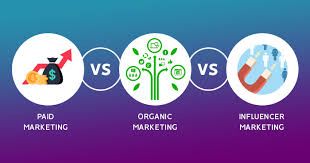This is the most common question that would surface in contemplation of which marketing approach to adopt.
Before we get into details, We'd like to share some of the concerns that's been raised by brands when it comes to influencers marketing. "Creating ads is a more affordable alternative to reach out to targeted audience without overspending". There are several delivery optimisation, Cost per click(CPC), Cost per Mille(payments are made only after 1000 impressions), Cost per Acquisition (charges occur only when consumers purchase products or sign up for services).
We've also received a few feedbacks from different brands mentioning they have not paid for the services from influencers only sponsoring products and services to them in return for the advertisement on social media. Now, Brands realise the effectiveness of influencers marketing but due to the constraints that they can’t execute both platforms due to the budget allocated, they are placed in the dilemma of choosing between the best channel.
We've identified a few reasons why brands chose to avert away from a marketing approach. Cost, which is their primarily concern if the services are too costly for their budget allocated. Results, Are the Return of Interest (ROI) presented reasonable for the cost incurred?
To cast light over this topic, We acknowledge the need for brands to rule out the inferior options so identifying the advantages and disadvantages of Influencers marketing and the other platforms is the best way to get across.
Influencers Marketing
Advantages
- Authentic content : Users seeing influencers post have usually willingly "followed" or "subscribed" to the influencer activity, so there's nothing invasive or obtrusive about how the contents would appear.
- Avoids restriction : Sponsored influencer content is posted by established social media accounts, therefore without the need to abide by native advertising restrictions such as content appropriation, format and length.
- Content creation and production : Partnering with influencers and reputable influencers agencies eliminates the need for brands to create their own content. Many influencers are seasoned content creators who know how to craft messages that appeal to their audiences, removing conceptualization worries and production burdens from marketers.
- Campaign execution : associating with influencers marketing also involve influencers marketing agencies who will be in charge of all the execution of the campaign and see it through to completion. Brands only require to oversee and coordinate with agencies to come up with the best content materials.
- Cross - Platform promotion: when partnering with influencers, many have sizeable audiences on their adjoining social media platforms such as blogs, instagram, facebook and snapchat. Brands can leverage on their massive audience base to reach out to as many targeted audience as possible.
Disadvantages
- Influencers management : When brands approach influencers directly to assist the advertising, it can be quite a hassle to manage the contents and the expectations. Influencer campaigns inevitably require relationships with influencers. Brands which are interested in working with them are advised to find the right talent, develop agreements that clearly define objectives and expectations.
- Fake followers : The number of aspiring influencers has grown exponentially over the last several years. Somewhat expectedly, the growth has resulted in some opportunists employing unethical practices such as buying fake followers to increase the amount of audience in the social media platform. To avoid this, it’s important that businesses do their due diligence to ensure their time and money are well spent or work with established influencer marketing agencies that are well versed in this area.
- Commitment : While influencer marketing is achievable on a variety of spends, the most successful campaigns will require a relationship and time investment on the influencers end.
Facebook Marketing
Advantages
- Content format : Native advertising on Facebook provides a wide variety of content styles, from text and photos to videos and carousels. The adverts manager will also include clear CTA (call to action) buttons and interfaces that can lead directly to conversion.
- Segmentation and targeting : Facebook offers marketers the ability to find and target audiences based on their demographics, interests, and other quantitative data.
- Data : Facebook offers tools to help measure performance, as well as A/B test different ads and features. However this may incur additional cost on the split ads.
- Flexible budget and scalability : Marketers are able to select the delivery optimisation and the budget they plan on spending.
Disadvantages
- Overt advertisements: Audiences may have banner or advertisement blindness to certain types of native advertisements when viewed on desktop.
- Lack of engagements : Audiences don’t voluntary opt in to view advertisements on social media. As a result,social media users aren't as likely to comment, engage with, or share native advertisements.
- Inorganic audiences : Native advertising on facebook is based on criteria created by the platform. Such audiences may be too broad or too narrow or just altogether miss the mark for some brands and businesses.
- No cross-promotion: Native advertising on facebook works exclusively within the platform. Content created specifically for native ads will need to be reproduced or reformatted and reposted for social cross-promotion
- Cost & Competition (CPC based) : Native ads are cost per click priced meaning they fluctuate based on demand (i.e. different criteria such as time of year/day, targeted locale, and desired audience). As such, Facebook native ads for certain seasons or quarters, especially Q4, can vary widely in rates. Moreover, brands will need to compete with other businesses for ad opportunities targeting any given criteria.
